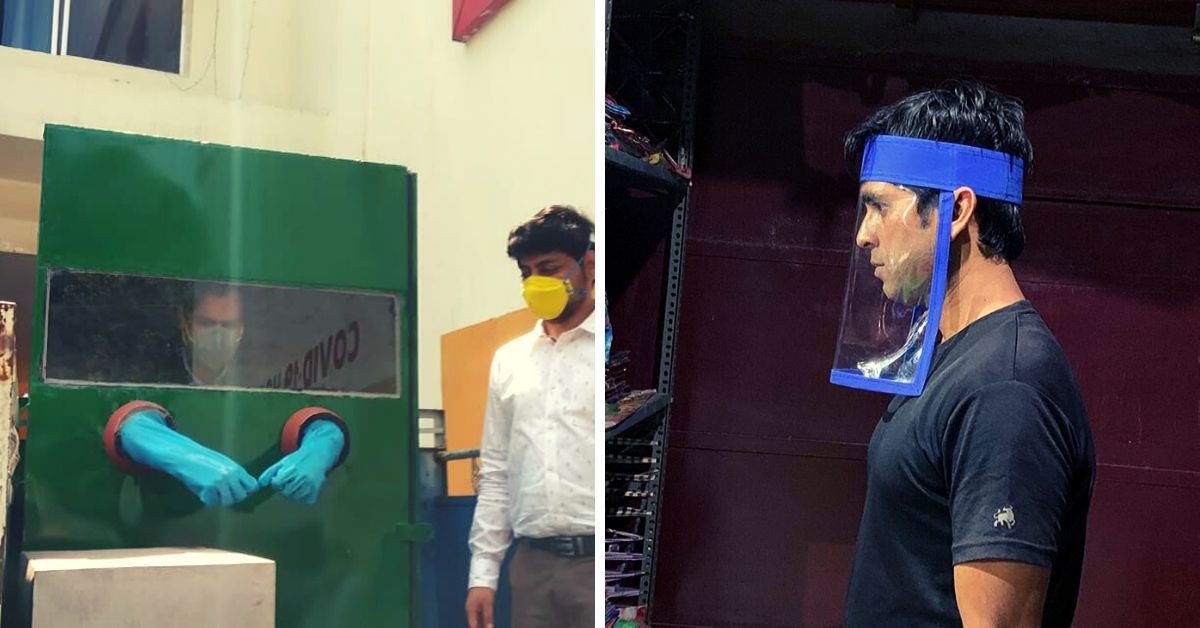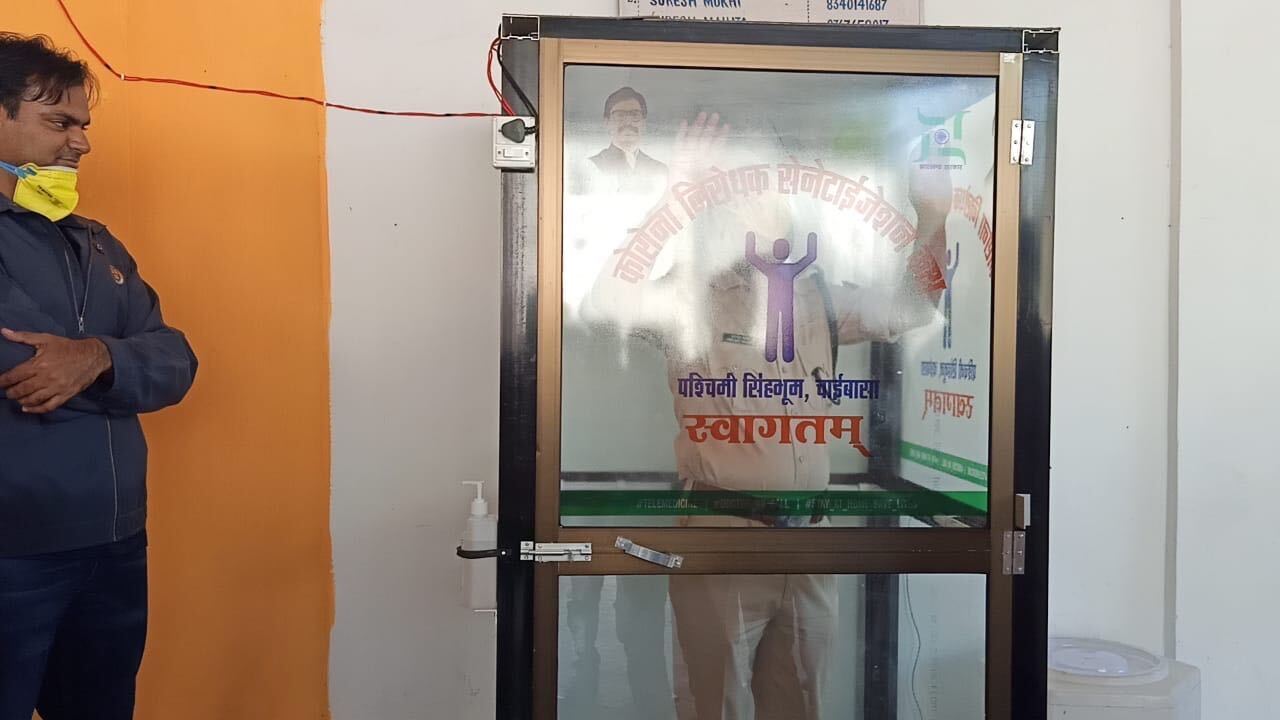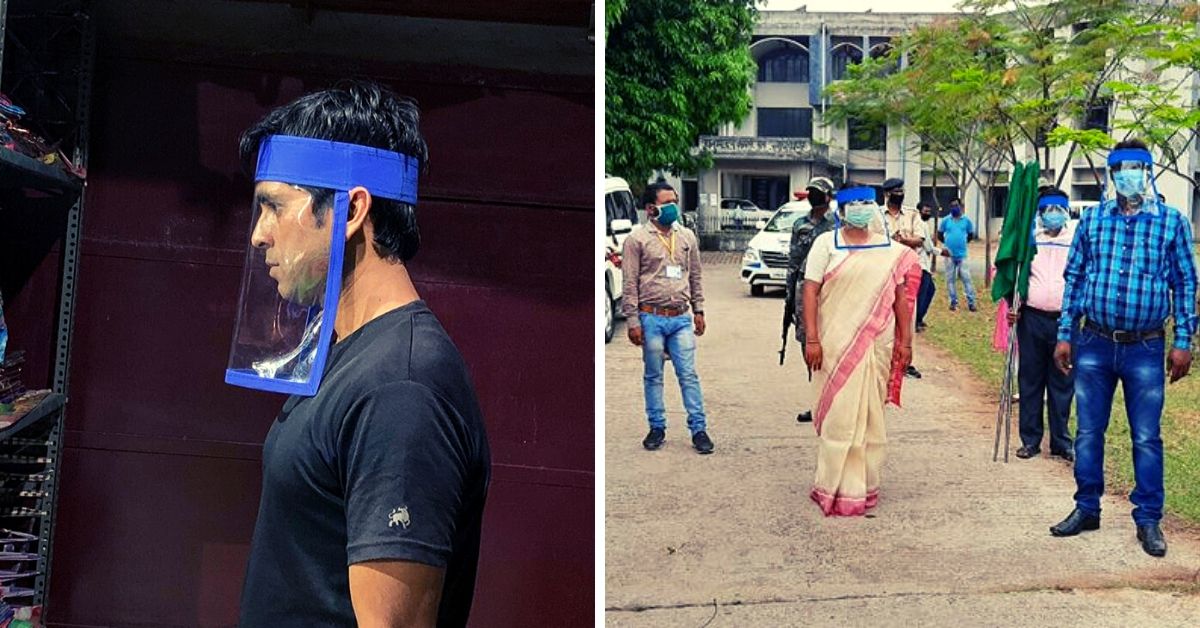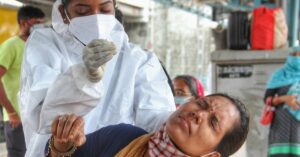5 Low-Cost Innovations By This Engineer-Turned-IAS Keeps Health Workers Safe
From a remote-controlled robot that delivers food and medicines in the hospital to a chamber that can disinfect a person in 30 seconds, here’s how this IAS officer from Jharkhand is fighting COVID-19

Even though Jharkhand’s West Singhbhum district has not recorded any positive cases of COVID-19 so far, Aditya Ranjan, its Deputy Development Commissioner (DDC) is doing everything in his capacity to eliminate the risk as much as possible.
“Since we have other deep-rooted issues like naxalism and poverty, we have to be extra vigilant in how we handle the pandemic and religiously following the motto of ‘prevention is better than cure.’ We have focused on designing inventions that reduce any physical interaction for both, potential patients and health personnel,” Aditya tells The Better India.
The Better India’s “BETTER TOGETHER” initiative has brought together civil service officers from across the country as they help migrant labourers, daily wage earners, frontline workers, and all those who need our help most in these troubled times. You can join us and support them in this fight against COVID-19.
Unable to view the above button? Click here
From disinfectant chambers to low-cost protective shields, the IAS office has put his engineering skills to use and built cost-effective inventions. Here are five of them:
1. Disinfectant Chamber
Aditya has designed a portable chamber that uses a mist sprayer to spray skin-friendly sanitizer throughout the body and takes only 30 seconds to disinfect a person.
The chamber has been placed at the South Eastern Railway Hospital in Chakradharpu.

“What makes this chamber unique is that there is no use of hypochlorite, sulphur or ionised water that may cause health risks. Since sanitisers can cause eye irritation, every person passing through the chamber has to cover their eyes,” says Aditya.
While the installation cost was Rs 25,000, the running cost of the chamber is Rs 1,400 per hour as it uses seven litres of sanitiser every hour. This chamber also makes the dressing process of a Person Protective Equipment (PPE) kit safer.
“The person wearing PPE has to make sure he/she does not touch the outer surface of the kit to avoid infection. Right after passing through this chamber, the disinfectant health worker can wear the kit,” he adds.
2. Co-Bot
When Aditya read about doctors testing positive for the Coronavirus, he came up with a Co-Bot (collaborative robot) that can deliver medicines and food to patients and thus cuts down human interference.
The Co-Bot is deployed in the isolation facility of Chakradharpur Railway Hospital.
Explaining the features of this machine, Aditya says, “The remote control-run robot can carry 30 kilos and can travel up to a distance of 300 feet. It comes with a camera and speaker and is washable.”
3. Phone Booth Collection Centre
Aditya has built two phone booths (static and portable) that reduce the workforce needed to collect samples of coronavirus tests.
Only two health workers are required to run the air-tight booth–one collects nose and throat swab from inside the booth, and the other sanitises the booth after every collection.
“Usually, it takes three people to collect the swab, and after each collection, the PPE kit has to be changed. Here, there is only one person inside the chamber who instructs the potential patient through the microphone. After the person deposits the swab in a box, the health worker takes it through hanging gloves without coming in contact with the person. The kiosk takes three minutes to collect the sample and every day, we can collect 100 samples. There is no need to change the PPE kit, thus saving thousands of rupees,” Aditya explains.
While the static structure is placed at the Chaibasa Sadar hospital, the mobile one can be transported on a vehicle at COVID-19 hotspots to collect the samples.
4. Face Shield
Before the countrywide lockdown was extended till 4 May, people working in various sectors including the police force and railways raised concerns about coming in contact with others.
As a means to help them, Aditya designed a cheap face shield that prevents bodily fluids from reaching the wearer and is it to be worn in addition to the mask and protective equipment.

Priced at Rs 110, the shield is made from transparent PVC sheet and consists of a forehead strap and a silicone strap.
The district has made a total of 3,000 shields so far with the help from Women Self-Help Groups, and members under the Jharkhand State Livelihood Promotion Society (JSLPS) and have distributed it among health workers, police and Railway Police Force.
“We do not want any frontline workers infected by the virus. This shield, which can be assembled in under five minutes, protects the eyes, nose and mouth from fluids,” informs Aditya,
5. I-Bed
The I-Bed (isolation bed), is a hospital bed laminated with a washable plastic cover that isolates one patient from another and minimises the risk of spreading infection.
“The cost per bed is Rs 15,000, and we have manufactured 50 such beds that are placed in two of our hospitals. The idea is to disinfect the room and change the plastic cover after one set of patients leave. The beds also protect the doctors and nurses from contracting the deadly infection,” says Aditya.
If Aditya’s effective strategy of being prepared in all arenas and keeping the health and safety of frontline workers priority is replicated in other parts of the country, we can significantly reduce the transmission rate.
Unable to view the above button? Click here
Also Read: Meet the IPS Officer Who Helped An Autistic Child Get The Camel Milk He Needed
(Edited by Gayatri Mishra)
Like this story? Or have something to share?
Write to us: [email protected]
Connect with us on Facebook and Twitter.
If you found our stories insightful, informative, or even just enjoyable, we invite you to consider making a voluntary payment to support the work we do at The Better India. Your contribution helps us continue producing quality content that educates, inspires, and drives positive change.
Choose one of the payment options below for your contribution-
By paying for the stories you value, you directly contribute to sustaining our efforts focused on making a difference in the world. Together, let's ensure that impactful stories continue to be told and shared, enriching lives and communities alike.
Thank you for your support. Here are some frequently asked questions you might find helpful to know why you are contributing?


This story made me
-
97
-
121
-
89
-
167














